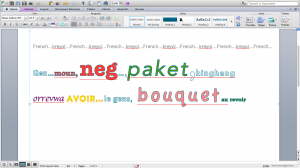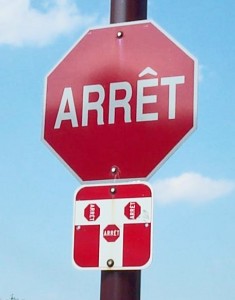French vs kreyol: Haitian hurricane in a coffee cup?
The kreyol vs French controversy may be a Haitian hurricane in a tas kafe (coffee cup).

Might Haiti elect to teach its children French properly, albeit in kreyol? What’s wrong with having French as a foreign ‘official’ language?
The argument goes that Haitian children should be instructed in kreyol rather than French because, according to a recent news agency report, “less than 10 percent of the country’s 10 million people speak French fluently, and in most schools, even the teachers don’t understand it very well although they’re asked to teach in it.”
Arika Okrent argues in The Week that “children can learn French, or any other global language, once they have learned how to learn in their primary language.” She points out that “there are fewer speakers of Estonian, Icelandic, and Danish than there are of Haitian Creole, but no one is suggesting that speakers of those languages give up their primary language of instruction for a global language. In fact, they manage to learn both provincial and global languages quite well.”
Quite so. She has a point but perhaps, rather a small one.
Haiti’s colonial history makes it a natural environment for French. We’ll get to the question of kreyol instruction forthwith, but the initial issue is the parlous state of French teaching in this country. Why don’t Haitian schoolteachers understand French – the language of instruction – very well? Is it more to do with an educational system that doesn’t do enough to train its teachers – in whichever language? Is it to do with a system that doesn’t care much about teaching anyone very much or very well? If the system remains deeply flawed, a totally kreyol school education is unlikely to produce better teachers or well-taught students.
This is not to say that kreyol shouldn’t replace French as Haiti’s primary medium of instruction. That is a given. But it’s a mug’s game to see it as an either-or issue. What’s wrong with Haitian children learning everything – including French! – in kreyol?

Arret, meaning stop
For what it’s worth, and it’s admittedly not worth as much as before, French is still a global language. It is an official language in 29 countries and of all UN agencies and many international organizations. According to some estimates, French speakers will number approximately 500 million people in 2025 and 650 million people, or approximately seven percent of the world’s population by 2050. That said, Gary Girod in New Geography suggests that across Europe, French has declined from being the lingua franca and is now falling behind German and English. He says that English is now spoken by 41 percent of Europeans and only 19 percent speak French. But others, notably Montreal authors Julie Barlow and Jean-Benoît Nadeau, who write copiously on language and culture, dispute this. They offer, what they describe as “a conservative estimate” of about 220 million French-speakers across the planet. Interestingly, they say that “only one third of speakers are native to the language – about 80-85 million. All the others learn it at school. In that respect, there has been no cataclysmic collapse of French.”
Anyone can dispute figures but it’s harder to challenge the unquantifiable sense that French still retains a certain cachet. The advertising cashes in on this with the soignee suggestion that those who know French are au fait with all that is elegant, aesthetically pleasing and intellectually a la mode.
It would be foolish for Haiti to give up on French and the inherent linguistic advantage that comes with being a former French colony. Instead, wouldn’t it be wiser to build on it? Shouldn’t it teach its children everything – and teach them well -including fluent, idiomatic French in kreyol? What’s wrong with having French as a well-taught ‘foreign’, official language, howsoever paradoxical that may sound?


